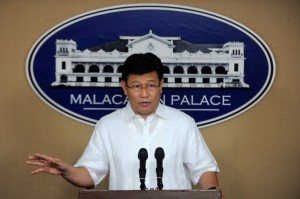MANILA, Philippines – The Philippines said Monday it was seeking to increase royalties from mining companies while imposing more restrictions to protect the environment and local communities.
The policy contained in a new executive order signed by President Benigno Aquino III said no new mining permits would be approved until Congress passed a bill backing the increase.
The order, announced by Environment Secretary Ramon Paje after months of heated debate between mining firms, environmentalists, tribal groups and church leaders, seeks to impose a five percent royalty on the companies’ gross earnings compared to the existing two percent tax.
“Basically, the executive order intends to increase the revenues of government from mining,” Paje told reporters.
The order extends a moratorium on mining permits that Aquino imposed last year when he was still drafting the new executive order.
Paje stressed the order would respect existing mining agreements with the 33 mining operations already in the country, but would be imposed on new entrants.
He said existing contracts would be reviewed to ensure the companies are complying with their obligations.
Paje said if the law was passed by 2016 the country could earn an additional 16 billion pesos ($381 million) from the higher royalties.
In addition, the order designates all abandoned mine waste and tailings as state property, allowing the government to extract any remaining minerals. This could potentially raise another 50 billion pesos, Paje added.
The order also bans mining in 78 areas designated as “eco-tourism” sites and in “prime agricultural and fishing areas”, and imposes controls on poorly-regulated “small-scale mining industry”, particularly banning the use of mercury, which can poison the environment.
Finance Secretary Cesar Purisima expressed confidence the new order would help the industry and boost revenues.
“We are confident that by investing in a stronger regulatory framework and a more equitable revenue sharing mechanism, we are improving mining’s long-term growth potential,” he said in a statement.
The Chamber of Mines of the Philippines said it welcomed the new rules, hoping it might end lengthy debates over the sector.
“We are hopeful that the policy will harmonise conflicting interests, encourage investments, and foster sustainable development especially in the countryside where it is greatly needed,” a chamber statement said.
The executive order still leaves hanging the issue of whether local governments can overrule mining permits issued by Manila, an issue affecting a potential project by Swiss giant Xstrata.
The project worth some $6.0 billion in the strife-torn island of Mindanao has been delayed by the local government’s ban on open-pit mining.
While the new order asserts national laws are above local ordinances, Paje said it would be up to the courts or the local government department to determine if the open-pit ban would hold up.
The Philippines is believed to have some of the biggest mineral reserves in the world — the government estimates the country has at least $840 billion in gold, copper, nickel, chromite, manganese, silver and iron ore deposits.
However, the minerals have been largely untapped, partly because of a strong anti-mining movement led by the influential Catholic Church, while poor infrastructure and security concerns have also kept investors away.
